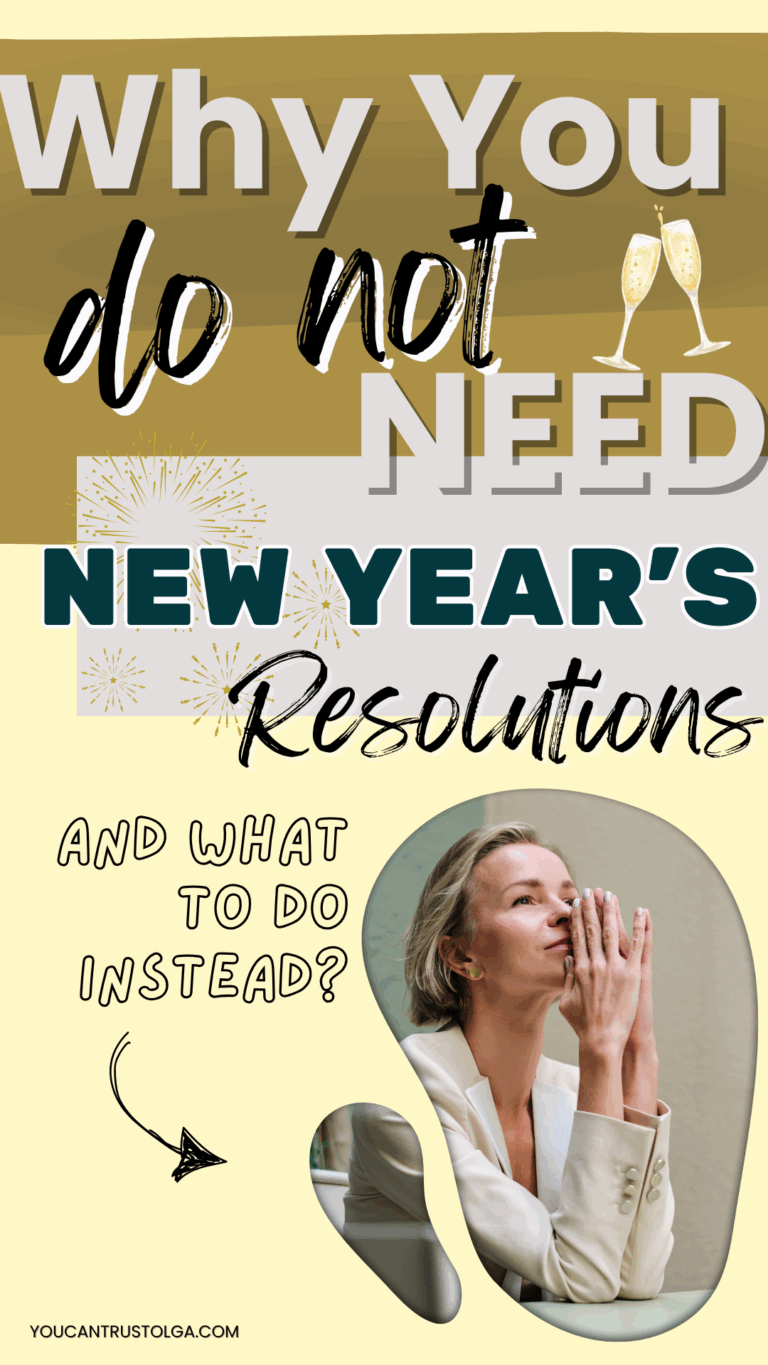I used to make a list of resolutions every year.
They were neat, ambitious, and slightly overwhelming. Something about “use less social media,” “lose five pounds,” “make better financial decisions” always made it onto the page.
But if I’m being honest, I can’t remember a single one of those lists that actually worked. I’m not even sure where they are.
So I started wondering: Why do we keep doing this?

The New Year hits, anxiety rises, and suddenly everyone’s supposed to have a five-point plan for becoming their best self.
But real change, the kind that lasts, doesn’t come from a bullet list. It comes from clarity. From awareness. From pausing long enough to ask:
WHAT DO I ACTUALLY WANT? AND WHY?
That’s why I’m done with resolutions. I’m trading them for something more honest. I’m starting the year with mindfulness, and I invite you to do the same.
The Problem with Resolutions
There’s something quietly exhausting about the way we approach change in January.
Most New Year’s resolutions are built on a shaky foundation: a list of shoulds, shame, and borrowed goals.
We tell ourselves we’ll wake up at 5 a.m., cut out sugar, stop scrolling, start meditating, journal daily, read more, drink water, run five miles, and finally become our best selves.
And listen, I’m all for growth. But most resolutions don’t actually support growth – they just reinforce the belief that something is WRONG WITH YOU now.
Resolutions often come from a place of self-rejection. They imply:
You’re not enough yet. You have to fix this. If you just try harder, you’ll finally be okay.
That kind of thinking doesn’t create change; it creates burnout. It fuels the same old cycle of control, shame, and disappointment.
Even if you do stick to a resolution, you might find yourself chasing an image that was never truly yours.
Something society told you to want. Something you wrote down because it sounded like a good idea, not because it felt alive in your body.
Real change doesn’t come from a pressure-filled list made on January 1st.
It comes from clarity.
From awareness.
From knowing what actually matters TO YOU, and moving toward that from a place of compassion, not punishment.
“But Don’t I Need to Improve Myself?”
At this point, you might be wondering:
“But wait… if I don’t push myself with goals, how will I ever change?”
That’s a fair question.
In psychology, there’s something called the paradoxical intervention. It’s when a therapist suggests the client lean more into the exact behavior they’re struggling with.
For example, if a client is obsessively trying to be perfect, the therapist might say, “What if you tried to be even more imperfect this week?”
If someone feels ashamed about procrastinating, the intervention might be: “Why not intentionally take the whole day off?”
I know it sounds backward, but it often works — because pressure and resistance usually feed the very behavior we’re trying to fix.
When we stop fighting it, something unexpected happens: the behavior softens. The shame loses its grip. The nervous system relaxes.
So here’s the paradox of self-improvement:
The more we try to force ourselves to change, the more stuck we feel. But when we give ourselves permission to not change, we often shift naturally.
That’s why this year, you don’t need to write a resolution list.
You don’t need to reinvent yourself.
You don’t need to turn your body, your habits, or your life into a productivity project.
You’re allowed to start the new year exactly as you are. And ironically, that’s often where real growth begins.
Mindfulness is the answer you've been looking for
Mindfulness is the path to that clarity. It doesn’t demand improvement. It invites awareness. And in that awareness, you begin to notice what actually matters to you.
You realize you don’t want ten goals — you want peace.
You don’t want a different body — you want to feel good in the one you have.
You don’t want to overhaul your life — you want to reconnect with it.
That’s the difference. Resolutions are often based on noise — what culture tells you you should want. Mindfulness helps you notice what you actually want.
When you trade pressure for presence, you stop chasing someone else’s version of success — and start creating a life that fits.
so what to do instead
1. Set 1–2 clear intentions for how you want to feel or show up this year.
Skip the big performance goals. Instead, choose words or phrases like: be more present with my kids, say no without guilt, create before I consume.
Write these on a sticky note and place them somewhere you’ll see them daily.
2. Use mindful journaling to check in each week.
Pick one day (Sunday night or Monday morning works well) and respond to a few simple prompts:
What felt good this week?
What drained me?
What do I need more of next week?
Keep your answers short. Bullet points are fine. The goal is awareness, not perfection.
3. Choose one grounding ritual to support your intention.
If your intention is to slow down, try a five-minute morning stretch without your phone.
If your intention is to be more present, take a short walk after work and name five things you see.
Repeat that one ritual daily for one month — no pressure to add more.
4. Revisit your values monthly.
At the end of each month, ask:
Did I live in alignment with my values?
What pulled me off track?
What do I want to recommit to next month?
This is how you stay connected to real change — not by forcing results, but by CHECKING IN with what matters and adjusting gently.
Try This: A Simple Mindful New Year Practice
Try this gentle, grounded way to close the year and begin the next with clarity and presence.
Take 20 minutes. Light a candle if you want. Or don’t. Sit somewhere without your phone. Breathe. Let the dust settle.
TO CLOSE THE YEAR
Ask yourself:
What surprised me about this year — in good ways and hard ones?
What did I outgrow, even if I didn’t mean to?
What moments felt like me?
What am I carrying that I don’t want to bring into the new year?
What do I want to honor before I move forward?
You don’t need to come up with perfect answers. Just pay attention to what comes up.
TO BEGIN THE YEAR
Ask:
What do I want to feel more of this year?
What helps me feel that way, even a little?
What might shift if I stopped trying to improve myself and started listening to myself?
What does my version of a good year look like — even if no one else would be impressed?
What’s one small thing I want to stay connected to this year?
Again, no pressure to solve anything. This isn’t a blueprint. It’s a conversation with yourself.
OPTIONAL RITUAL
If it feels right:
Light a candle for what you’re releasing. Blow it out.
Light another for what you’re inviting in. Let it burn.
Or take a short walk. Let your body move while your mind settles.
Or write a letter to yourself you won’t read until next December.
This practice won’t change your life overnight.
But it might shift the way you meet yourself — and that’s where everything begins.
final thought
ou don’t need to start the year with pressure or performance. You don’t need a new version of yourself, either.
What you might need is a little space. A moment to listen in. A way to get honest about what’s working, what’s not, and what actually matters to you — not to everyone else.
Mindfulness gives us that space. It helps us shift from self-improvement to self-connection. From doing more to noticing more.
So if you’re tired of resolutions that don’t stick, maybe try something different this year.
Pause. Reflect. Begin from within.





